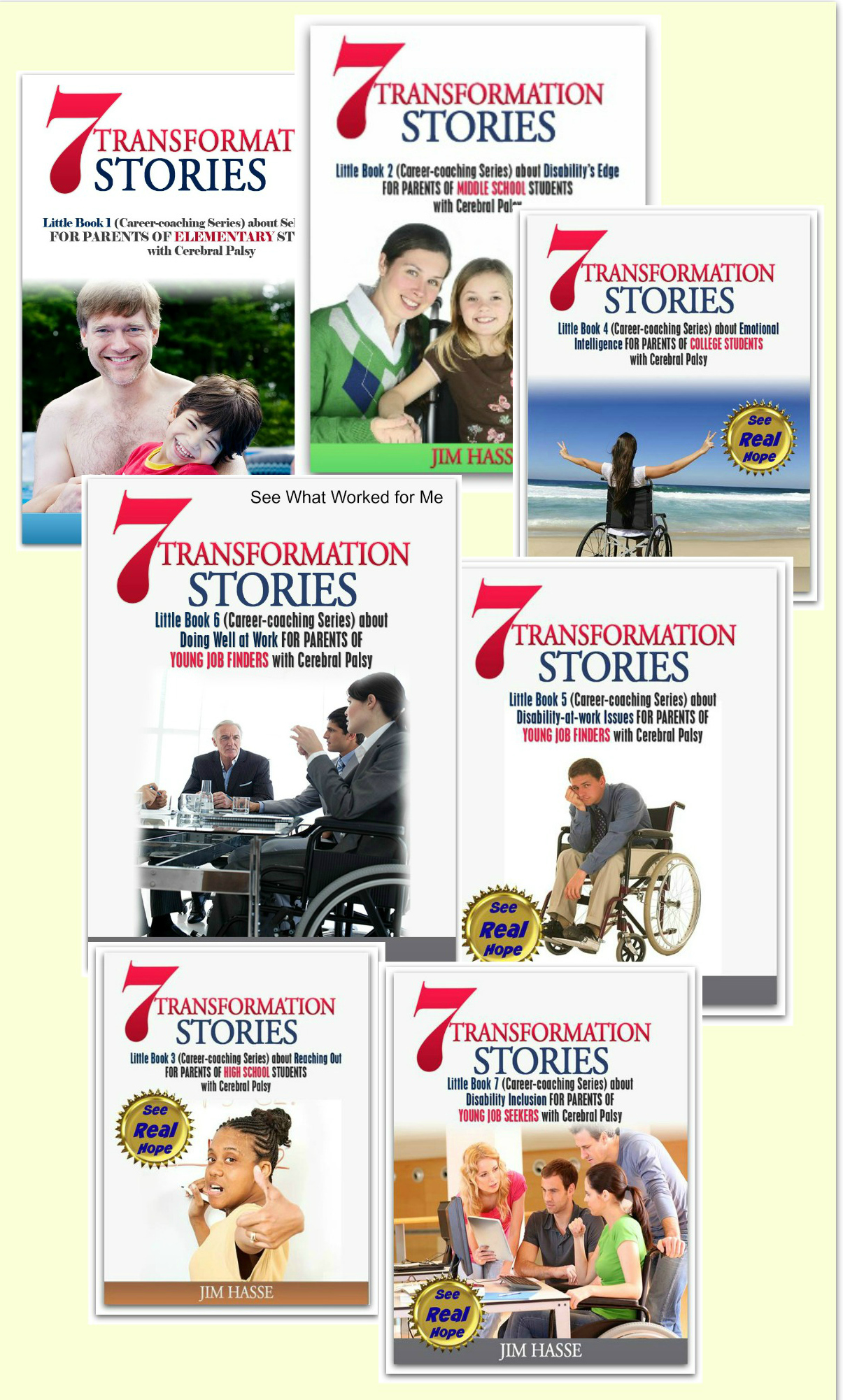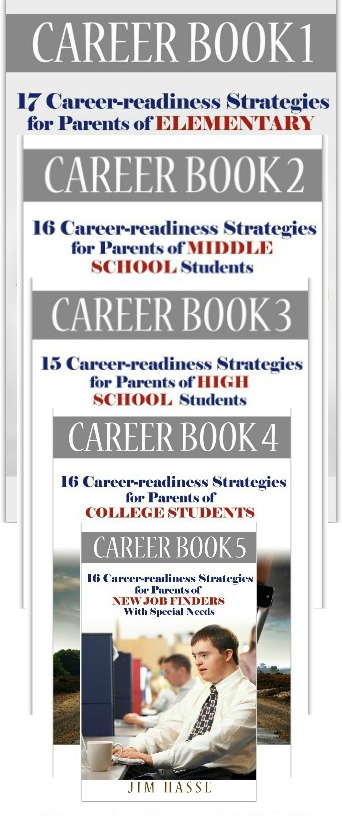Job Titles: Cerebral Palsy Career Builders for Elementary Students
By Jim Hasse, ABC, GCDF, Disability Employment Expert
_________________________________________________________
Identifying occupations by job titles is the first of 20 career building steps for your elementary student with cerebral palsy (CP).
Here you'll also find the road map outlined by the National Career Development Guidelines about the 10 skills your youngster can develop during elementary school and links to 20 individual articles about how to develop those skills.
My experience
I first learned about occupations and job titles when I began attending orthopedic school in second grade. I remember the big black locomotive spewing black smoke and the black dust from the adjacent coal yard.
I had also learned that the guy in bib overalls peering out the window of that locomotive was a “locomotive engineer.”
As a farm kid, I had not seen a locomotive before and couldn’t identify a picture of it when I first entered orthopedic school during an IQ test (to the chagrin of my new teacher), but my mom countered, “What do you expect? He’s a kid from a rural area.”
I knew what a carpenter was, though. My great grandfather always had a hammer in his overalls and was the fix-it person around the farm. One day my grandmother asked me what I wanted to be when I grew up, and I replied, “Carpenter.”
Keeping in mind my cerebral palsy, she scoffed, much to my disappointment and confusion “You better think of something else,” she replied sharply.
What I didn’t articulate at the time and she didn’t understand is that I wanted to be a “builder.”
But, by the time I was 10, I had a pretty good feel for what people did for a living and what job titles were all about.
And, I knew I wanted to build things through writing.I loved to write, but it was not easy for me. It was a grind.
It helped to have a good mentor at home, though. My mom wrote “how to” articles as a hobby, and, as a “retired “ teacher, she was teaching me how to write -- first poetry, then Haiku, then short stories, then essays and then term papers.
My five families
My “first” family consisted of dairy farmers. My mom, dad and two younger brothers and sister all helped doing the daily chores. I even washed the evening dinner dishes while the other members of the family were working in the barn with our 60 registered Brown Swiss cows.
But, then came grade school, and, over a span of seven years, I lived with four different “house families” during the week. That was necessary because I attended an orthopedic grade school 60 miles from our home farm.
During my first “house family” experience, I lived with a middle aged couple with a grown family where the father was a custodian at a state university, and the mother was a homemaker.
The father in my second “house family” was a factory worker. He made Oscar Mayer wieners. The mother stayed home, helping raise two grade school boys.
My third “house family” had two pre-school children. Both the mom and dad were educated as teachers. The father worked as an accountant and built the family’s home (including a “secret” fall-out shelter (yes, it was the 1950s).
In my fourth family, I joined two daughters and a brother, all in grade school. The mother was trained as a dental hygienist and the father was a professor of agriculture who managed a university experimental farm. I still remember the day he received his master’s degree.
So, by the time I was in eighth grade, I had experienced family life under five very different circumstances. I knew I had career choices beyond dairy farming, which I knew I couldn’t very well do anyway due to my cerebral palsy.
I now realize that was an unusual (but very helpful) learning experience. By eighth grade, I knew what various jobs meant in terms of every-day living. And, I knew I wanted to be a writer or more specifically, a journalist.
What I didn’t know at the time is that I would eventually become a company journalist (circa 1960), business communicator (circa 1980), and online content developer (circa 2000) -- all job titles that not yet been “invented” in 1953.
Why knowing job titles early on is important
It’s never too early to begin talking to your youngster about occupational interests and the specific jobs and job titles which are associated with those interests. At the elementary level, career information for kids usually focuses on:
- The awareness of
individual differences and preferences.
- The enjoyment of learning
and doing.
- The skills to make a decision.
- The broad characteristics and expectations of work.
10 key skills for your elementary youngster
According to the National Career Development Guidelines (NCDG), here are 10 important career skills your youngster can develop during elementary school:
- Identify personal interests,
likes, and dislikes
- Describe personal strengths
and talents
- Demonstrate positive
behaviors and personal characteristics, such as honesty, dependability,
responsibility, integrity, and loyalty
- Recognize that one should
accept responsibility for one’s behavior
- Interact with others in a
fair, helpful, and respectful way
- Recognize that people have
many life roles and that these need to be balanced
- Demonstrate study skills and
good learning habits
- Be able to set goals and work
toward achieving them
- Describe different ways to
make decisions
- Recognize a variety of skills that are important for success in school and work, such as communicating, critical thinking, problem solving, and interpersonal skills
I follow the NCDG framework for each of these five stages in your youngster’s development:
- Elementary, when your child
becomes aware of job titles.
- Middle/junior high, when your youngster
begins to appreciate individual personalities and preferences among family
and friends through a simple career test.
- High school, when your youngster
needs to start gaining work experience through part-time jobs.
- College, when your youngster needs
to master specific job seeking skills, such as absorbing interview tips.
- Job search, when your young man or daughter becomes a job finder by putting together job seeking skills into a comprehensive marketing campaign and career management approach that he or she can routinely update throughout a lifetime.
As your youngster progresses through each of these five developmental milestones, I’ll show you the barriers I personally encountered (and worked around) as a person with cerebral palsy (CP) and the options you and your youngster can consider for your own “workarounds.”
20 articles: Each about a career builder
Specifically, I have divided the 10 NCDG competencies for your elementary school student into two sets of 10 disability-focused articles. One set is based on self-confidence, and the other set is focused on competitive advantage for your elementary school youngster:
10 career builders which foster your youngster’s self-confidence. These include developing:
- Self
concept (Manage Your Feelings, How to Manage Fear)
- Career mindedness (Motivated Moms, Motivated Kids)
- Decision
making skills (Self Confidence Quotes, Good Skill Set)
- Career
information gathering abilities (Visual Learning, Virtual Learning)
- Career path management skills (Career Planning Checklist, Career Development Skills)
10 career builders which provide opportunities to discover a personal competitive edge. These include developing:
- Interpersonal
communication skills (Career Development Plan, Teamwork Building)
- Balance between work and personal time (Goal Setting
for Kids, Steps to Setting a Goal)
- Educational
and lifelong learning orientations (Problem Solving Activities, Career Choice Information)
- Career
trend tracking abilities (Career Information for Kids, Problem Solving Training)
- Job marketing skills (Cerebral Palsy Movies, Developmental Milestones)
Since 1997, I’ve met many accomplished people with CP who are successfully working within a wide variety of occupations and job titles. On this site, you’ll find their success stories (and how their parents and other mentors have helped them succeed).
Follow me, and you and your youngster with CP will also have the opportunity to share your views about specific mentoring issues as well as personal success stories with others facing some of your same challenges.
You'll have the opportunity to grow together within each of the above stages of discovery and learning -- perhaps starting with recognizing job titles.
Return from Job Titles to Cerebral Palsy Career Builders.
This is Creative Commons content. You can freely and legally use, share and repurpose it for non-commercial purposes only, provided you attach this sentence and the following attribution to it (including the two links):
Originally written and illustrated by Jim Hasse, ABC, GCDF, owner of Hasse Communication Counseling, LLC, who, as a person with cerebral palsy, served for 10 years as a vice president in a Fortune 500 company during his 29-year career in corporate communication. He’s an Accredited Business Communicator, certified as a Global Career Development Facilitator and author of 14 Amazon books about disability awareness and disability employment issues.





